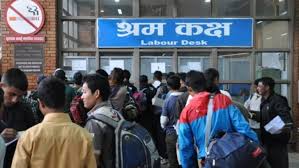International Migrants Day to be marked for week amid calls for migrants’ security (Commentary)
 Deepraj Sanyal / Kathmandu: The country is observing the International Migrants Day, which falls on 18 of this month, for a week around the theme – ‘Commitment for Safe Foreign Employment: Solidarity of Us All.’
Deepraj Sanyal / Kathmandu: The country is observing the International Migrants Day, which falls on 18 of this month, for a week around the theme – ‘Commitment for Safe Foreign Employment: Solidarity of Us All.’
The Ministry of Labour and Employment announced in a news conference Monday that the Day would be marked for a week with it, the Foreign Employment Promotion Board, Nepal Association of Foreign Employment Agencies and the organisations working in the sector, organising various programmes and events.
In this connection, the Ministry would be holding the main programme at the Labour Village at Tahachal on December 18. The same day, the Ministry would launch the online system for issuing the prior and final work permit to the aspirant migrant workers, Joint Secretary at the Ministry Abha Karna Shrestha said.
An International Migrants Day Preparation Main Committee has also been formed for the commemoration of the Day. Ministry’s secretary Laxman Prasad Mainali is the coordinator of this committee.
The International Labour Organization (ILO) puts the number of migrants worldwide at over 230 million, and of them 150 million are migrant workers. In Nepal, around 500 thousand youths leave the country for overseas employment.
International Migrants Day commemorates the day on which the United Nations endorsed the Convention on the Protection of the Rights of All Migrant Workers and Members of Their Families in 1990. The UN started marking the Day (i.e. 18 December) as the International Migrants Day since 2000.
The Nepali context
Labor migration is found playing a key role in the context of Nepal’s economy and social development. Financial data shows that remittance accounts for approximately 28 per cent of Nepal’s total GDP during the fiscal year 2013/14. In addition, the impact of the remittances at the household level has also led to a reduction in the poverty level of the nation. While the remarkable contribution made by migrant workers to the national economy is widely recognised, workers continue to face many challenges in the migration process.
The challenges associated with labor migration requires concerted action both within the country of origin as well as in the destination countries. Issues like lack of labor rights, absence of fundamental principles and rights at work, poor compensation, trafficking, fraud and abuse need to be tackled with a strong political will with a multi-stakeholder support.
As per the ‘Labour Migration for Employment – A Status Report for Nepal: 2014/2015’, the surge in out-migration for foreign employment has brought profound changes in the socio-economic fabric of the country. Although the labour migration phenomenon has emerged as an alternative livelihood opportunity for many Nepali households, it poses new challenges for the government and policy-makers in managing safe migratory flows between the countries of origin and destination. Strengthening the migration governance system is needed in the current context and that requires reliable easily accessible data that informs on the present situation and provides a basis for future interventions. The problem of ensuring safe migration has been further exacerbated by the earthquake of April 2015, which increased the risk of unsafe migration due to the growing economic and social vulnerabilities faced by the people.
The contribution of remittances towards the country’s development finance has not been well recognized in comparison with overseas development aid, foreign direct investment and debt. Yet, the contribution of international migrant remittances to the economy is phenomenal, whereas foreign aid represents only 15 per cent of the national budget. Nepal Rastra Bank calculates that around NPR 589.5 billion were remitted the formal banking channel in 2014/15, which was roughly equivalent to the size of the annual budget for that fiscal year. This is equivalent to around 29 per cent of the country’s GDP, which makes Nepal third in the world and top in South Asia in terms of the remittance contribution to GDP. Because remittances tend to be a stable and often countercyclical source of foreign exchange earnings, they help keep the balance of payment steady.
Contributions to poverty reduction
According to the Millennium Development Goals Progress Report 2013, foreign employment and remittances accounted for a considerable portion of the poverty reduction among those households that send members abroad to work but not among the population at large or among households with internal migrants. In fact, the incidence of poverty would jump from 19.3 per cent to 35.3 per cent if remittances were cut off. From 1990 to 2013, the population living below the national poverty line declined from 42 per cent to 23.8 per cent.
The Millennium Development Goals report also noted that migration draws increasing attention in the world nowadays. Mixed with elements of unforseeability, emergency, and complexity, the challenges and difficulties of international migration require enhanced cooperation and collective action among countries and regions. This requires creating more dialogues and interactions within countries and regions, as well as promoting experience exchange and collaboration opportunities.
Globalization, together with advances in communications and transportation, has greatly increased the number of people who have the desire and the capacity to move to other places. This has created challenges and opportunities for societies throughout the world. It also has served to underscore the clear linkage between migration and development, as well as the opportunities it provides for co-development, that is, the concerted improvement of economic and social conditions at both origin and destination. RSS
